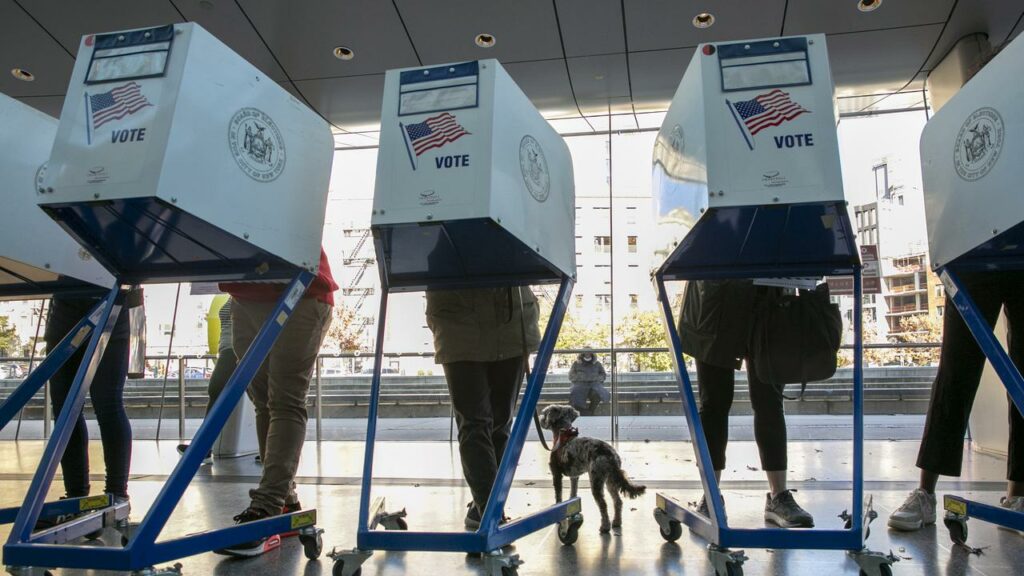Tight race for control of US Congress
Tim Reid and Gabriella Borter |

Republicans have made modest gains in US midterm elections but Democrats have done better than expected.
Control of Congress and the future of President Joe Biden’s agenda was unclear on Wednesday morning as vote counting continued.
Many of the most competitive races were too close to call but Republicans acknowledged the election was not producing the sweeping “red wave” victory they sought.
In the House of Representatives, Republicans were favoured to win a narrow majority that would allow them to block Biden’s legislative priorities and launch investigations into his administration and family.
By early Wednesday, Republicans had flipped six Democratic House seats, Edison Research projected, one more than the minimum they need to take over the chamber.
But Democrats were doing much better than many had expected.
In a critical win for President Joe Biden, Democratic candidate John Fetterman flipped a Republican-held US Senate seat in Pennsylvania, beating celebrity doctor Mehmet Oz and bolstering his party’s chances of holding the chamber.
The mood at the White House improved as the night wore on, with once-nervous aides celebrating Fetterman’s victory and saying they still hoped to hold the Senate.
Control of the Senate depended on tight races in Arizona, Georgia and Nevada, where ballots were still being counted.
The Georgia race appeared to be headed for a runoff vote on December 6 because both the Democratic and Republican candidates were falling short of the 50 per cent needed for victory.
If the Republicans do take control of Congress, they will have the power to cripple Biden’s agenda and could also block aid to Ukraine, although analysts say they are more likely to slow or pare back the flow of defence and economic assistance.
With a House majority, Republicans would demand deep spending cuts and also seek to make former President Donald Trump’s 2017 individual tax cuts permanent and protect corporate tax cuts.
House Republican Leader Kevin McCarthy had hoped to celebrate a resounding victory that would propel him into the top job of speaker.
Instead, he had to settle for a promise to his supporters: “When you wake up tomorrow, we will be in the majority and (Democratic Speaker) Nancy Pelosi will be in the minority,” he said on Tuesday night.
The party that occupies the White House almost always loses seats in elections midway through a president’s first four-year term, and Biden has struggled with low public approval.
But Republican hopes for a “red wave” of victories faded as Democrats showed surprising resilience in several key races. Democrats were projected as the winners in 11 of the 13 close contests that had been decided.
“Definitely not a Republican wave, that’s for darn sure,” Republican US Senator Lindsey Graham told NBC in an interview.
Pelosi said in a statement, “It is clear that House Democratic members and candidates are strongly outperforming expectations around the country.”
Trump, who took an active role in recruiting Republican candidates for Congress and is strongly hinting at a third run for the presidency in 2024, had mixed results among the candidates he backed.
Meanwhile Florida Governor Ron DeSantis, who could be a main Republican challenger to Trump in 2024, defeated Democratic challenger Charlie Crist by nearly 20 percentage points, Edison projected.
Voter anger over the Supreme Court’s June decision to overturn the nationwide right to abortion helped Democrats to curb their losses.
Democrats currently control the 50-50 Senate with Vice President Kamala Harris able to break any ties.
Thirty-five Senate seats, all 435 House seats and three dozen governors’ races were on the ballot.
High inflation and abortion rights were voters’ top concerns, exit polls showed, followed by crime.
Scores of Republican candidates have echoed Trump’s false claims that his 2020 loss to Biden was due to widespread fraud, raising fears among Democrats that they could interfere with the 2024 presidential race.
Reuters


